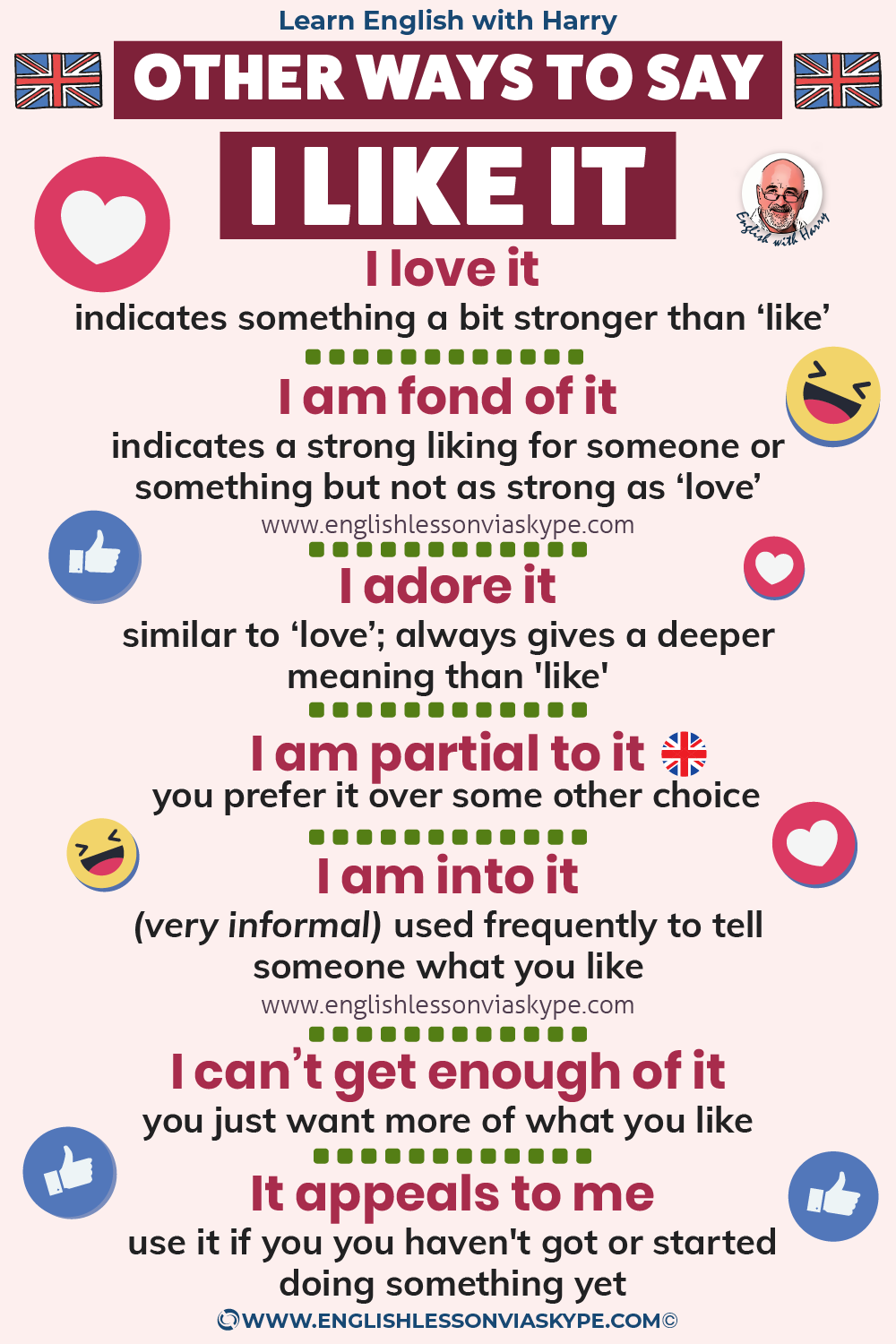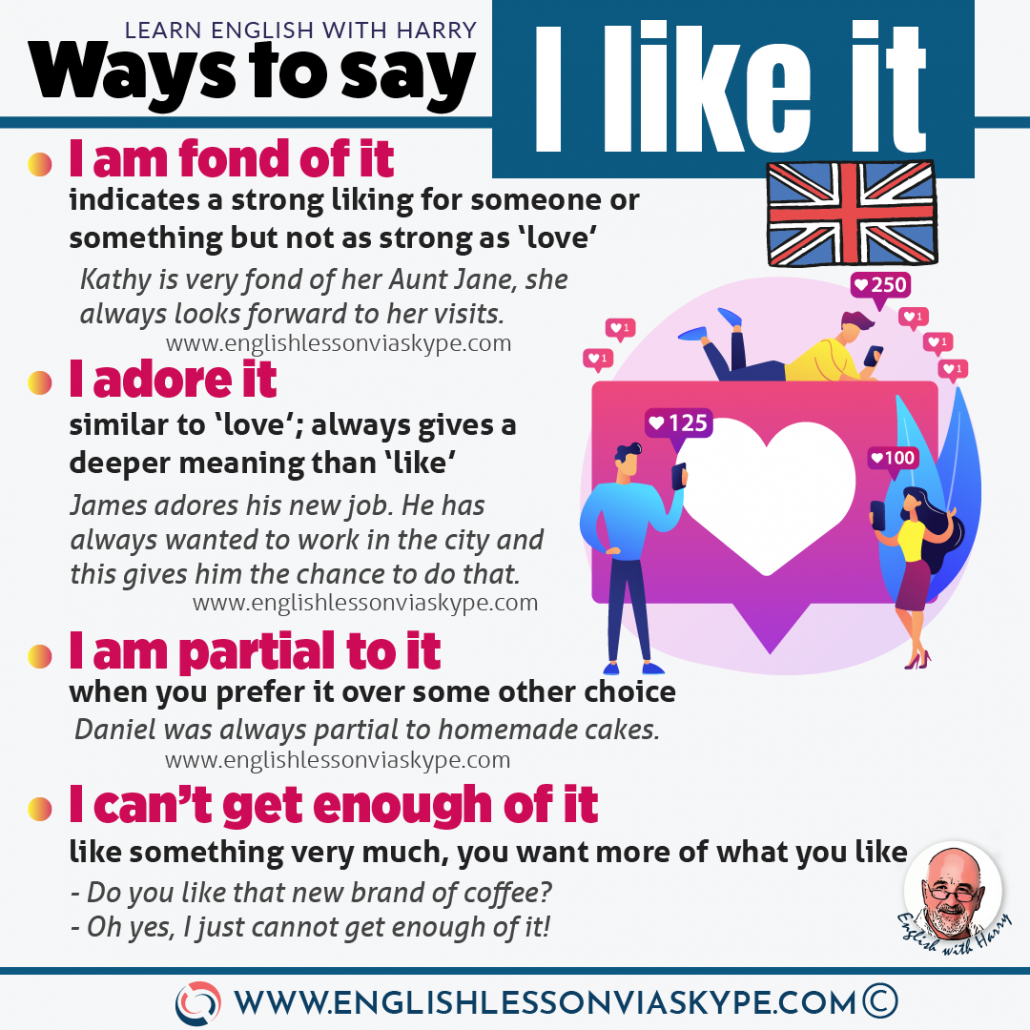Other words for LIKE and why you need to use them.
Avoid using the same words over and over again. Boost your English vocabulary and improve your speaking and writing skills.
Table of Contents
Harry
Harry is a native English teacher with over 10 years of experience both online and in face-to-face lessons. With his extensive experience in business, he specialises in Business English lessons but happily teaches ESL students with any English learning needs.
other words for like in english
The word LIKE is a very popular word in the English language.
We use LIKE as an adjective, a verb and even a noun.
The only bad thing about the verb LIKE is that we use it way too often.
Some students may wonder whether we have any other words for LIKE in English?
In fact, there are many, many ways to say instead of LIKE. So here are some English words and phrases that you can use as alternatives to I LIKE.
Intermediate to Advanced English Marathon
INSANITY: doing the same thing over and over again and expecting different results.
- What you’ll learn:
- better understanding of more complex grammar structures
- advanced English vocabulary words
- British & American slang
- perfect your listening skills through practing different accents
- This marathon is for you if you’re:
- stuck at an intermediate English level
- tired of confusing explanations
- a mature student
- shy & introverted
We use I LIKE to express our feeling about somebody or something. For example:
I like ice cream.
I like Mathew.
Of course, we could add various English adverbs to give more meaning to it. For example:
I really like ice cream.
I really like Mathew.
I genuinely like Mathew.
I totally like her.
But it can be a little boring to always use the same words or expressions so here are some suitable alternative words you can use instead of LIKE.
Other Ways to Say I like it in English
I love
Love indicates something a bit stronger than “like”.
Example:
👱♂️ Would you like a cup of tea?
👩 I would love a cup of tea.
I am fond of
Fond of indicates a strong liking for someone or something but not as strong as “love”.
Example:
Kathy is very fond of her Aunt Jane, she always looks forward to her visits.
I adore
Like ‘love’, ‘adore’ always gives a deeper meaning than ‘like’.
Example:
James adores his new job. He has always wanted to work in the city and this gives him the chance to do that.
I am partial to
A very British English expression. To be partial to something means you prefer it over some other choice.
Example:
Daniel was always partial to homemade cakes. He enjoyed the cakes in the local bakery but a homemade cake was his favourite every time.
Some more informal ways of saying LIKE include the following:
to dig something
This is a very 1960’s or 1970’s expression. People used to ‘dig’ the new music by The Beatles. So this is really something related to the hippy years.
Example:
I dig your outfit.
I am into
Very informal and almost slang expression. This is used frequently to tell someone what you like.
Example:
The teacher asked Kevin what music he liked, ‘I am really into U2, they get it right every time.
I cannot get enough
Again more informal meaning you just want more of what you like.
Example:
👨🦳 Do you like that new brand of coffee?
👱♀️ Oh yes, certainly, I just cannot get enough of it!
Or as Depeche Mode sing I just can’t get enough
Other Words for Like in English
So here are the words we can use instead of LIKE, let’s go through them one more time:
- I love
- I am fond of
- I adore
- I am partial to
- I dig
- I am into
- I cannot get enough
More Information
You will love these English lessons
English Vocabulary
How to Learn English
English Idioms
Penchant Predilection Proclivity Propensity
People will admire your writing skill if you choose proper and exact word that must match that particular situation. Here, we have another word for Like. Let us see more another word for Like.
Writing
Penchant (N)
Another word for like Penchant borrows from French origin from the Latin pendere, in which penchant literally means inclined. a special liking for something; If you have strong preference for something like playing, eating, swimming, etc; it means you have strong liking for that thing.
_____ for something
- He has a penchant for asking stupid questions.
- Her penchant for mathematics helped her become an engineer.
- Indians are penchant for food.
Predilection (N)
Another word for like Predilection is based on the Latin verb praediligere, or «prefer before others,» which breaks down to prae means before, and diligere means»choose or love.» It is natural, seen to have born with. If you like something and don’t know why it means you have predilection for that thing.
- Why do I always feel predilection for writing?
- We should follow our own predilections.
Proclivity (N)
Another word for like is proclivity; A proclivity is a tendency to behave in a particular way or to like a particular thing, often a bad way or thing.Vocabulary.com says:
When you have a proclivity, it feels automatic — you like what you like; you don’t even have to think about it. The origin of the word proclivity supports this feeling. Proclivity comes from the Latin word proclivis, which literally means «sloping forward.» You slide toward a proclivity — no effort is needed.
- Why do some people have proclivity for violence.
- Men have proclivity for women.
Propensity (N)
A propensity to do something or a propensity for something is a natural tendency that you have to behave in a particular way .
If you like something that is really bad, use the word proclivity, otherwise use the word propensity.
- Trump has a propensity to scream, Kim has whimper.
I have read some fantastic books on English language that really helped me
improve my writing. You can buy my recommended books on
Amazon. Here is the
lists below:
Books on Grammar:
| Books | Buy Links | Rating |
|---|---|---|
The Elephants Of Style |
4.5/5 | |
English Grammar in Use Book |
4.5/5 | |
Practical English Usage |
|
4.5/5 |
The Elements of Style |
4.5/5 | |
Essentials of English |
4.5/5 | |
Handbook of English Grammar and Usage |
4.5/5 | |
Woe Is I |
4.5/5 | |
Grammar Girl’s Quick and Dirty Tips for Better Writing |
4.5/5 | |
It was the best of sentences, it was the worst of sentences. |
4.5/5 | |
If you want more books on English language, click the link
|
What is another word for Like?
-
similar, allied in characteristics
-
enjoy, feeling
-
allied in characteristics, allied
Use filters to view other words, we have 2241 synonyms for like.
If you know synonyms for Like, then you can share it or put your rating in listed similar words.
- APA
- MLA
- CMS
Download Article
Download Article
If you can’t stop saying the word “like,” you’re not alone. Unfortunately, overusing that word can cause your friends and coworkers to make unfair assumptions about your education or intelligence levels. Thankfully, there are some solid ways you can stop saying the word “like” to sound smarter and keep your audience engaged for longer. Read through these tricks to change the way you speak for the better.
-
Pair the word with an action so you can catch it faster. If you’re talking and you say “like,” quickly tap yourself on the thigh or pinch yourself on the wrist. The more you notice it, the more you can break the habit.[1]
- Keep the movement small so that it doesn’t distract you from what you’re saying.
- You can also pull on a hair tie around your wrist or flick yourself in the leg.
Advertisement
-
Try to count the number of times you say “like” in 1 minute. Then, record yourself again, and try super hard not to say the word “like” at all. Try doing this a couple of times per day until you get into the habit of checking yourself on your own.[2]
- You can also download an app like LikeSo to automatically count the number of times you say “like” for you.
-
Think about what you say before you say it. If you’re talking quickly or you’re in a fast-paced conversation, you might be thinking about what to say next instead of what’s coming out of your mouth. Try to really slow down and contemplate every sentence before you say it to avoid saying “like.”[3]
- If you hear yourself say the word “like,” that’s okay! Just make a note of it and try not to say it again in the same conversation.
Advertisement
-
Do this instead of saying “like” in between phrases. When you say a sentence and you come to a moment when you’d normally say “like,” just stop. Take a deep breath and let the silence fill the space in your sentence.[4]
- This can also help you avoid other filler words like “um” or “ah.”
-
You can use “roughly,” “approximately,” and “around.” These words are helpful in sentences where you’re trying to convey an approximate amount, like money spent or time wasted. Make your sentences sound more specific by saying things:[5]
- “We spent around $500 at the mall today.”
- “I wasted roughly 30 minutes driving back and forth.”
- “We’ve used approximately 60% of our inventory.”
Advertisement
-
You could also use “yelled,” “whispered,” or “shouted.” Saying “like” before a quote is a super common way this word gets misused, and it’s probably where you’ll hear yourself using it the most. Instead, try getting super specific with your descriptor.[6]
- Instead of saying, “I was like, ‘no way!’” say, “I thought to myself, ‘no way!’”
- Instead of saying, “He was like, ‘I’m not interested.’” say, “He said, ‘I’m not interested.’”
-
You don’t need the word “like” to emphasize your point. By omitting the word “like,” you can actually strengthen your sentences and speech. Stick to words like “very” or “incredibly” to make your sentence stronger.[7]
- For example, instead of saying, “He was, like, so angry,” say, “He was very angry.”
- Instead of saying, «The sky was, like, so blue,» say, «The sky was a deep blue color.»
Advertisement
-
The more words you know, the easier time you’ll have. Try reading new books, playing word games like Scrabble, or keeping a thesaurus handy to look up synonyms. If you can think of something else to say besides “like,” you’re already halfway there! You could try phrases such as “for example,” “nearly,” or “about.”[8]
- You can also download apps like Word of the Day to get new words sent directly to you.
-
Use it when you’re expressing enjoyment or comparing 2 things. You could say “I really like chocolate” or “He acts like his father.” If you keep the definition in mind, you can tell when you’re using “like” the right way and when you’re using it as a filler word.[9]
Advertisement
-
“Um,” “ah,” and “er” can also get repetitive. As you cut down on your use of the word “like,” be careful you’re not replacing it with something else! When in doubt, just don’t say anything.[10]
- You might also find yourself saying “you know,” “well,” and “okay.”
Add New Question
-
Question
My friend is almost addicted to saying «like.» He will say it in every sentence. How can I tell him and help him without sounding rude?
This answer was written by one of our trained team of researchers who validated it for accuracy and comprehensiveness.
wikiHow Staff Editor
Staff Answer
You could pretend that you’re working on cutting down the number of times you say «like» yourself. Have him record you and count how many times you say it in 1 minute. Then, ask him if he wants to try, and record him next. You can gently point out how many times he’s saying it without being mean or talking down to him.
-
Question
What other words can I use for like? I have to many «likes» in my paragraph.
You can use «similar to» in the sense of «The noodles were like rubber.» When using the word «like» to express approval, as in «I like pie,» you can say «I enjoy pie» or «I love pie» or «Pie is awesome.» If you’re using the word «like» as a filler word, the way this article is talking about, just remove it entirely.
-
Question
What form of speech is «like» considered?
As a term of enjoyment, like is used as a verb, or an action word. When saying it as a term of similarity of comparison, it is a preposition.
See more answers
Ask a Question
200 characters left
Include your email address to get a message when this question is answered.
Submit
Advertisement
References
About This Article
Thanks to all authors for creating a page that has been read 594,891 times.
Reader Success Stories
-
«Being in a Western country, I was exposed to overuse of the word «like» through people around me. Being a…» more
Did this article help you?
Get all the best how-tos!
Sign up for wikiHow’s weekly email newsletter
Subscribe
You’re all set!
I think that there is a very obvious answer to this question. The opposite of «better» is «worse.» The opposite of «more» is «less.» So, which of these sentences sounds correct:
I like dogs worse than cats
I like dogs less than cats?
The answer is clearly «I like dogs less than cats.»
The sentence «I like dogs worse than cats» would be flagged by any native speaker as being incorrect. No one would ever say that. The answer, in my honest opinion, lies in semantics, not grammar.
Think about it deeply; it simply doesn’t make sense to say that you like something better. The word «better» tells you something about the worth of something. Whereas the word «Less» tells you something about a quantity (less butter) or about the perceived strength of something (less light). To increase or decrease the force of your ‘liking,» only two appropriate words are available to you: you like something more, or less. You can’t like something better or worse, because these are words that comment on the value of liking, not its intensity.
To say «I like cats better than I like dogs» means, semantically, that your liking for dogs is somehow better than your liking for cats. And it’s obvious that that is not what most people intend to say when they use «better» in this context.
What they mean is that their liking for dogs is GREATER than their liking for cats, not that their liking for dogs is in some odd way BETTER than their liking of cats. Dogs may be better than cats, but our liking of dogs can’t be better than our liking of cats.
Of course someone might think that it is better to like dogs than it is to like cats. But there are no «better» ways of liking something.





























